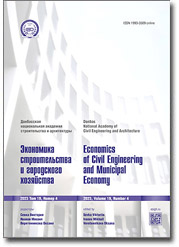Methodological Approaches to Assessing Social Efficiency at Various Stages of Project Implementation
Abstract: Currently, in the conditions of limited resources, any projects require a particularly thorough analysis of the feasibility of their implementation. Along with economic efficiency, in many projects it is important to determine social efficiency. In this paper, the sources of the emergence of the concept of «social efficiency» in scientific literature are determined. It is revealed that social efficiency, due to its specificity, always has a clear link to the subjects and objects of the implementation of the relevant activity. The main approaches to determining the social efficiency of a project are formulated. The stages of the project life cycle are considered in terms of their internal components. Methodological approaches to assessing social efficiency at various stages of project implementation are proposed. To assess efficiency, it is proposed to use the following groups of indicators: project, social focus of the project, economic, political. The conclusion on the level of social efficiency of project implementation is formulated on the basis of the calculated integral indicator.
Keywords: efficiency, effect, social efficiency, project, life cycle stage.
Pages: 237-244.
For citation:
For citation: Malova, N. Yu. ; Kalustyan, Ya. V. Methodological Approaches to Assessing Social Efficiency at Various Stages of Project Implementation. – Text : electronic. – In: <em>Economics of Civil Engineering and Municipal Economy</em>. – 2024. – Vol. 20, N 3. – Р. 237-244. – doi: 10.71536/esgh.2024.v20n3.7. – edn: bmyhgz. – ISSN 1993-3509. (in Russian)

Vol. 20, N 3 (2024)
Journal: Economics of Civil Engineering and Municipal Economy
Publish house: Donbas National Academy of Civil Engineering and Architecture
Journal: Economics of Civil Engineering and Municipal Economy
Publish house: Donbas National Academy of Civil Engineering and Architecture
